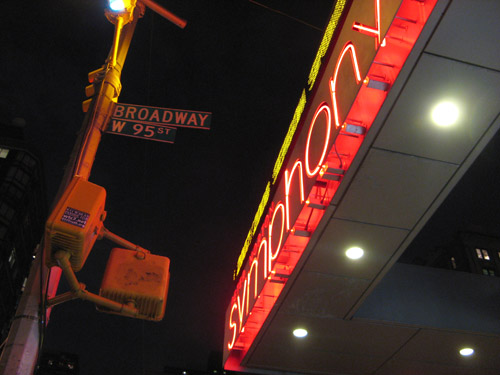John Oliver @ Symphony Space
After a light dinner at the not-so-divey Dive Bar on W. 96th Street — hey, I wasn’t about to cross the picket lines at Saigon Grill — we headed over to Peter Norton Symphony Space for the taping of John Oliver‘s upcoming Comedy Central special (scheduled to air on April 20).
We both knew the drill and made sure to arrive early, queuing up for our spots in the cold outside the theatre. And it was a biting, bitter cold, too: the type that chills to the bone, and against which no amount of Starbucks skim chai latte could insulate us. By the time were given the go ahead to file inside, I was in serious need of some warming laughter.


Oliver rose to the occasion brilliantly, delivering the kind of sharp, smirking political commentary — offered in dry British tones, “with more authority than you’re used to hearing” — that makes him such a popular correspondent on The Daily Show. He proved a remarkably good sport, too: about fifteen minutes in, the AV crew lost power to the video screen on stage, requiring Oliver to backtrack and run through a rather lengthy segment of his act several times — with the exact same jokes and “spontaneous” inflection. No doubt a nightmarish scenario for any comedian, but Oliver’s chucklingly rueful gamesmanship earned him an enthusiastic round of applause at the end.
Giving full credit (or blame) to the “10-year old Indonesian boy” to whom he had outsourced his joke-writing, Oliver covered topics ranging from colonialism, how Americans view the rest of the world, the school track incident that led him to pursue a career in comedy over sports, his teary-eyed Pavlovian response to all images backed by cheesy 80s power ballads (looking at you, Divine Miss M) and, with fellow comedian Andy Zaltzman, offered a brilliantly loopy argument on how the erosion of civil freedoms is a valid homeland security strategy, as it eliminates the very thing which the terrorists find most hateful about our country, thereby making us less appealing a target.
Also, some trenchant observations about American culture, as epitomized by the existence of a market for the inflatable floating grill — a barbecuing device used for cooking inside a swimming pool. Oliver cited the ludicrousness of such an invention as definitive proof that in terms of the sheer force of consumerism, America has no peer. Take that, China!
The roots of conspicuous consumption may be traced to post-World War II-era prosperity. We — as Americans, and particularly as New Yorkers — live in a culture driven by “stuff,” where so much of our lives revolves around the acquisition of material things as markers of a certain type of success. I found this recent New York magazine piece particularly resonant: “The Upside of the Downside — Why the Recession May Restore the City We Moved Here For.”
Despite being aware of “how loaded we are, comparatively speaking, and not just loaded in that abstract compared-with-the-developing-world way… loaded compared with most of the people in this city,” I too feel the “psychic effect of living in a place that is so in thrall to money, so dominated by the monoculture of luxury that even if you’re not on the front lines, working for a hedge fund or whatever, the values encroach on your life.”
I don’t know. Maybe that MacBook Air commercial is just getting to me.
There are 3 Comments ... John Oliver @ Symphony Space
Wow. The guy who wrote that New York Magazine article is totally clueless. The economic downturn has real effects on real people – people who will lose their jobs, their livelihood, their security. It’s not just about losing some value on your real estate or the stock market, or being less conspicuous about your consumption. So he’s relieved that the downturn will assuage his guilt? What a selfish prat.
March 6, 2008
I sensed the piece would cause some controversy.
The title of the article, while attention-catching, is a bit misleading I think. My read is that Joel Lovell isn’t so much wishing recession upon his neighbors so that he can feel better about his own (admittedly comfortable) life, but rather hoping that it returns a bit of pre-boom perspective: a New York where such superficial markers aren’t at the forefront of people’s minds.
Probably not possible, regardless of the state of the economy.
March 7, 2008
It’s his own fault for slavishly participating in that mass consumerism he complains about in the first place. No one forced him to become materialistic; plenty of New Yorkers aren’t. Maybe he should work on what he can control (his own behavior and attitude) rather than pointing out that, “oh, at the least the economic downturn will abate the rampant consumerism in New York that i find objectionable.” Like I said: prat.
Go for it ...
Search
Popular Tags
Categories
Archive
- July 2010
- July 2009
- January 2009
- November 2008
- September 2008
- August 2008
- July 2008
- June 2008
- May 2008
- April 2008
- March 2008
- February 2008
- January 2008
- December 2007
- November 2007
- October 2007
- September 2007
- August 2007
- July 2007
- June 2007
- May 2007
- April 2007
- March 2007
- February 2007
- January 2007
- December 2006
- November 2006
- October 2006
- September 2006
- August 2006
- July 2006
- June 2006
March 6, 2008